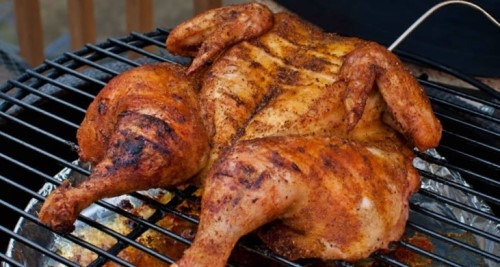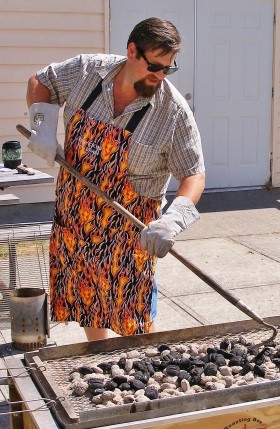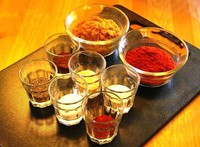- Home
- Latin Touch
- pork shoulder
Latin Touch
Recent Posts
Direct & Indirect Grilling Part Two
Posted by on

In our last post we talked about the importance of directly grilling, this time, let's talk about an equally important technique for delicious, juicy grilled meat...”Indirect Grilling.”
INDIRECT GRILLING
Indirect grilling is when we cooking adjacent, instead of directly over, the heat source(s).
Food is placed in an area heated by the flame (you're still cooking), but not directly in contact with it.
Traditional barbecue (slow-smoked meat) is probably the most well recognized food that uses the method of indrect heat cooking.
Large cuts, like pork shoulder, ham, brisket, whole turkey, and other food that require a prolonged cook time, require this method to keep them from drying out, or burning, before cooked through.
This method works best on a grill that is covered, I will usually use a combination of the Wind Shield and a large disposable hotel pan (inverted) to work as a lid for my food. Cuban Roasting Boxes are ideal for cooking these large pieces of meat, as you can build you fires at either end, place a drip pan* between them, and still have plenty of indirect cooking space between the heat sources.
Gas grills with 3-4 burners cn be used this was, too, but you will have far more limited cooking space.
When doing “long, low, and slow” cooking this way, plan to add a new batch of coal (pre-fired in a bbq chimney until gray & glowing, to each end about every hour, to keep an even cooking temperature.
Three Reasons to Always Use a Drip Pan
Often we use a combination of these two, starting out searing over direct heat, and then finishing by moving the food to the “open” side of the grill (over a hot water pan), covered, to finish at a lower, slower pace, allowing the interior to cook without overcooking or burning the surface, as we have with this spatch-cocked chicken:

RECIPE: Huli Huli Chicken
Brine
1 cup fine sea salt
½ cup coconut sugar
3 bay leaves
3 cups of ice
6-7lb free-range organic whole chicken
6 cloves of garlic, peeled/smashed
Dry Rub
2 Tbs garlic powder
2 Tbs sea salt
1 Tbs cayenne pepper
1 Tbs onion powder
1 tsp ground cumin Fresh black pepper
Juice of 1 lemon
Huli Huli Sauce
1 cup pineapple juice
½ cup soy sauce
2 Tbs. Sherry vinegar
½ cup light brown sugar
2 tsp. ground ginger
Preparing the Dish
“Spatchcock” the chicken by removing the backbone with heavy kitchen shears, and then cracking the breastbone to flatten.
Combine brine ingredients (except ice) along with one cup of water, in a pot, and bring to a simmer until salt and sugar has dissolved. Remove from heat and add ice. Once the liquid is cool, place the chicken in a gallon zip bag, pour the brine over it, and seal the bag, pushing out any air.
Place the bagged chicken in a bowl, and put in the fridge for one hour.
For the sauce:
Over medium low heat, combine the soy sauce, pineapple juice, ketchup, and sherry vinegar. Bring the liquids to a simmer and then whisk in sugar and ginger. Continue to simmer for about 5 minutes to reduce the sauce (still whisking), until the desired consistency is achieved.
Preheat the grill to high heat.
Remove the chicken from the brine, and pat dry. Coat the chicken on all sides with generous amounts of dry rub.
Char, breast side down, for 4-5 minutes watching carefully, so sugars don't burn, then flip breast side up, grilling for another 3-4 minutes. Move to indirect heat, cover and cook for an additional 15 minutes, turning every minute or so (huli-huli means “turn turn”), and drizzling with lemon juice.
Using a silicon basting brush, glaze the chicken with huli-huli sauce for the last 5 minutes of cooking.
Remove from heat and allow to rest, tented loosely in foil, for at least ten minutes before carving.
Serve over white rice with a side of mac salad!.

Keep Smokin!
~ Chef Perry
La Caja China Cooking
La Caja China World
La Caja China Party
La Caja China Smoke (Coming soon!)

How to Create Your Own BBQ Rub
What is a Rub?A Rub is a spice and/or herb blend that’s used to coat meats prior to cooking. Rubs can be completely dry or can incorporate some liquids. This is called a wet rub or paste. Rubs are typically used in barbecue and grilling because they stick to the meat whether it’s on a gas grill, a smoker, [...]
 Loading... Please wait...
Loading... Please wait...
